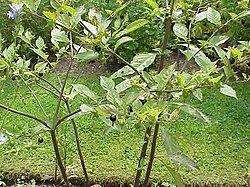Deadly nightshade
Deadly nightshade or belladonna (Atropa belladonna) is a well-known, hardy perennial shrub. It is a member of the nightshade family.
| Deadly nightshade | |
|---|---|

| |
| Scientific classification | |
| Kingdom: | |
| Division: | |
| Class: | |
| Order: | |
| Family: | |
| Genus: | |
| Binomial name | |
| Atropa belladonna | |

It can be found in a few different continents: Europe; North Africa; Asia; and North America, but is far less common there. Usually it grows in the shade. The plant does not like direct sunlight. Often it grows in places where the soil is rich in limestone.
Dangers of belladonna
Most parts of the plant are known to be very poisonous. Children have died from eating as few as three berries. One leaf contains enough poison to kill an adult. The root usually contains the most poison.
The poison present in the plant is called atropine.
Effects of the poison
The effects of atropine are dilated (big) pupils, hallucinations, and difficulty in seeing (the vision may not be as sharp as always, it may be difficult to focus on some object). Other symptoms include: problems keeping upright; feeling like one is flying; and being confused. The pulse of the victim grows faster and faster, and the rate at which the heart is beating will go up. Toxic reaction to atropine causes fever, delirium, stupor (nearly being unconscious) and rash on head, neck and upper trunk. There may be agitation, difficulty in speaking and swallowing. Coma and convulsions usually come before death.


